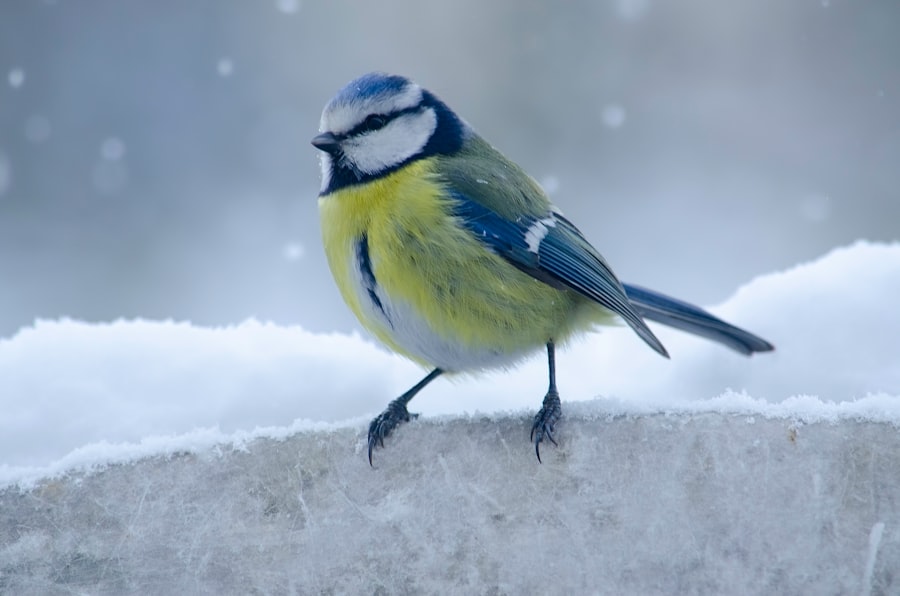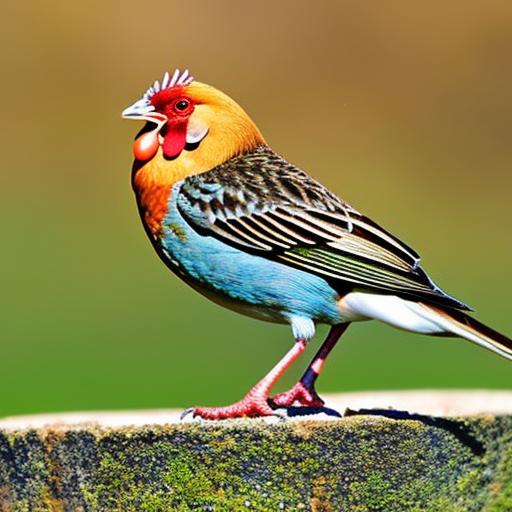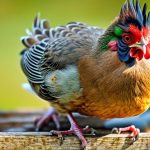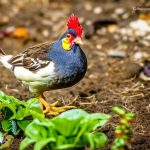Keeping birds with chickens in a backyard coop is a popular practice among poultry enthusiasts. It not only adds diversity to the coop but also offers several benefits. In this article, we will explore the advantages of having a mixed-species coop, such as increased biodiversity and pest control.
Having birds in a chicken coop can be beneficial in many ways. Firstly, it can lead to increased egg production. Certain bird species, such as ducks and geese, are known to lay eggs regularly. By adding these birds to your coop, you can enjoy a variety of eggs in addition to the ones laid by your chickens.
Secondly, birds can help with pest control. Many bird species have a natural inclination to eat insects and pests. By allowing them to roam freely in the coop, they can help keep the population of pests under control. This can reduce the need for chemical pesticides and create a healthier environment for your chickens.
Key Takeaways
- Keeping birds with chickens can provide a range of benefits, including pest control and increased socialization for chickens.
- Before adding birds to your chicken coop, consider factors such as size, temperament, and dietary needs.
- Some of the best bird species to keep with chickens include ducks, geese, and turkeys.
- Housing requirements for birds in a chicken coop include providing adequate space, nesting boxes, and perches.
- Maintaining cleanliness and hygiene in a chicken coop with birds is crucial for preventing the spread of diseases and parasites.
Benefits of keeping birds with chickens
One of the main benefits of keeping birds with chickens is increased egg production. Birds like ducks and geese are prolific layers and can significantly contribute to your egg supply. This is especially useful if you have a large family or sell eggs commercially. By having a diverse range of birds in your coop, you can enjoy a variety of eggs with different flavors and nutritional profiles.
Another advantage of having birds in a chicken coop is pest control. Birds are natural predators of insects and pests, and they can help keep the population under control. For example, ducks are known for their love of snails and slugs, which are common garden pests. By allowing ducks to roam freely in your coop, you can reduce the number of these pests and protect your plants.
Furthermore, birds can help keep the coop clean and reduce the risk of disease. Many bird species have a habit of scratching and pecking at the ground, which helps to aerate the soil and remove debris. This can prevent the buildup of waste and reduce the risk of bacterial or fungal infections. Additionally, birds can eat leftover food and spilled grains, reducing the chances of attracting rodents or other pests.
Factors to consider before adding birds to your chicken coop
Before adding birds to your chicken coop, there are several factors you need to consider. Firstly, you need to assess the available space in your coop. Different bird species have different space requirements, and overcrowding can lead to stress and aggression. Make sure you have enough space for both chickens and birds to move around comfortably.
Secondly, you need to consider the temperament and compatibility of the birds you plan to add. Some bird species may be more aggressive or territorial than others, which can lead to conflicts with your chickens. It is important to choose bird species that are known to be compatible with chickens and have a peaceful temperament.
Lastly, you need to be aware of the potential risks of adding birds to a coop without proper planning. Birds can introduce new diseases or parasites to your flock, so it is important to quarantine new birds before introducing them to your existing flock. Additionally, some bird species may have different dietary requirements or housing needs, so it is important to research and prepare accordingly.
Best bird species to keep with chickens
When it comes to choosing bird species to keep with chickens, there are several options that are known to be compatible and beneficial for the coop. Ducks are a popular choice as they are excellent foragers and can help control pests in the coop. They also lay delicious eggs and can be a great addition to your flock.
Geese are another good option as they are known for their protective nature. They can help deter predators and provide an extra layer of security for your chickens. Geese also lay eggs, although they may not be as prolific as ducks.
Turkeys are another bird species that can be kept with chickens. They are known for their friendly and curious nature, and they can add a unique dynamic to your coop. Turkeys also have the added benefit of being excellent foragers and can help control pests.
Housing requirements for birds in a chicken coop
When it comes to housing birds in a chicken coop, there are several requirements that need to be met. Firstly, you need to ensure that there is enough space for both chickens and birds to move around comfortably. Birds like ducks and geese require more space than chickens, so make sure you have enough room for everyone.
Nesting boxes are also important for birds in a chicken coop. Ducks and geese will need their own nesting boxes where they can lay their eggs. These boxes should be separate from the ones used by chickens to avoid conflicts and ensure that each bird species has its own space.
Roosting areas are another important consideration. Birds like ducks and geese may not roost like chickens do, but they still need a safe and comfortable place to rest. Providing elevated platforms or shelters can give them a place to relax and feel secure.
Feeding and watering birds in a chicken coop

Feeding and watering birds in a chicken coop requires some additional considerations. It is important to provide separate feeders and waterers for birds to ensure that they are getting the proper nutrition and hydration they need.
Birds have different dietary requirements than chickens, so it is important to provide them with appropriate feed. Ducks, for example, require a higher protein content in their diet compared to chickens. Make sure you choose a feed that is specifically formulated for the bird species you are keeping.
Watering birds in a chicken coop also requires some attention. Ducks and geese need access to water for bathing and drinking. It is important to provide them with a shallow container or pond where they can engage in their natural behaviors.
Maintaining cleanliness and hygiene in a chicken coop with birds
Maintaining cleanliness and hygiene in a mixed-species chicken coop is crucial for the health and well-being of both chickens and birds. Regular cleaning of the coop is essential to prevent the buildup of waste and reduce the risk of disease.
Remove any droppings or soiled bedding on a daily basis to keep the coop clean. Regularly disinfecting the coop with a poultry-safe disinfectant can also help prevent the spread of disease-causing bacteria or parasites.
It is also important to provide dust baths for birds. Birds like ducks and geese enjoy dust bathing, which helps them keep their feathers clean and free from parasites. Providing a designated area with sand or fine dirt can encourage this natural behavior.
Preventing diseases and parasites in a mixed-species chicken coop
Preventing diseases and parasites in a mixed-species chicken coop requires some proactive measures. Quarantining new birds before introducing them to your existing flock is essential to prevent the spread of diseases. Keep new birds separate for at least two weeks and monitor them for any signs of illness.
Regularly inspecting your birds for signs of parasites, such as lice or mites, is also important. If you notice any signs of infestation, treat the affected birds immediately and take measures to prevent the spread to other birds.
Maintaining good biosecurity practices, such as limiting access to your coop and practicing good hygiene, can also help prevent the introduction and spread of diseases. Keep wild birds away from your coop and avoid sharing equipment with other poultry owners.
Managing aggression and territorial behavior among birds in a chicken coop
Managing aggression and territorial behavior among birds in a mixed-species chicken coop is crucial to ensure the safety and well-being of all birds. Some bird species may exhibit aggressive behavior towards each other or towards chickens, so it is important to monitor their interactions closely.
Providing enough space for each bird species can help reduce aggression. Overcrowding can lead to stress and aggression, so make sure there is enough space for everyone to move around comfortably.
If you notice any signs of aggression or territorial behavior, such as pecking or chasing, it may be necessary to separate the birds temporarily. This can give them a chance to calm down and establish their own territories.
Enjoying the benefits of a diverse chicken coop with birds
In conclusion, keeping birds with chickens in a backyard coop can offer several benefits. From increased egg production to pest control, birds can be valuable additions to your flock. However, it is important to consider factors such as space, temperament, and compatibility before adding birds to your coop.
By choosing the right bird species and providing appropriate housing, feeding, and watering, you can create a safe and comfortable environment for both chickens and birds. Regular cleaning and hygiene practices are essential to prevent the spread of diseases and parasites.
With proper planning and management, you can enjoy the benefits of a diverse chicken coop with birds. Consider adding birds to your coop and enjoy the unique dynamics they bring. For further information on keeping birds with chickens, consult reputable poultry resources or seek advice from experienced poultry keepers.
If you’re interested in keeping birds alongside your chickens, you might want to check out this informative article on Poultry Wizard. It discusses the possibility of keeping guinea fowl with chickens and provides insights into their compatibility. Guinea fowl can be a great addition to your flock, as they are known for their pest control abilities and alertness. To learn more about whether guinea fowl can live harmoniously with chickens, click here: https://poultrywizard.com/keeping-guinea-fowl/can-guinea-fowl-live-with-chickens/.
FAQs
What birds can be kept with chickens?
Some birds that can be kept with chickens include ducks, geese, turkeys, and guinea fowl.
What are the benefits of keeping multiple bird species together?
Keeping multiple bird species together can provide benefits such as increased pest control, improved socialization for the birds, and a more diverse and interesting flock.
What are some considerations when keeping multiple bird species together?
Some considerations when keeping multiple bird species together include ensuring adequate space and resources for all birds, monitoring for any aggressive behavior, and providing appropriate feed and housing for each species.
Can different bird species share the same coop?
It is generally not recommended to house different bird species in the same coop, as they may have different housing and environmental needs. However, they can share the same outdoor space if it is large enough and has appropriate resources for all birds.
What should I feed my mixed flock of birds?
Each bird species may have different dietary needs, so it is important to provide appropriate feed for each species. Consult with a veterinarian or poultry expert for specific recommendations. Additionally, providing a mixed flock with access to a variety of forage and insects can be beneficial.
What are some potential risks of keeping multiple bird species together?
Some potential risks of keeping multiple bird species together include the spread of disease between species, aggressive behavior between species, and competition for resources such as food and water. It is important to monitor the flock closely and address any issues that arise.
Meet Walter, the feathered-friend fanatic of Florida! Nestled in the sunshine state, Walter struts through life with his feathered companions, clucking his way to happiness. With a coop that’s fancier than a five-star hotel, he’s the Don Juan of the chicken world. When he’s not teaching his hens to do the cha-cha, you’ll find him in a heated debate with his prized rooster, Sir Clucks-a-Lot. Walter’s poultry passion is no yolk; he’s the sunny-side-up guy you never knew you needed in your flock of friends!







